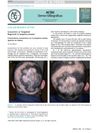 6 citations,
April 2012 in “Lasers in surgery and medicine”
6 citations,
April 2012 in “Lasers in surgery and medicine” Laser hair removal can cause a severe itchy rash in some allergic individuals, treatable with steroids.
 5 citations,
August 2019 in “International Journal of Women's Dermatology”
5 citations,
August 2019 in “International Journal of Women's Dermatology” The document concludes that it's important to recognize and treat hair loss in women of color, considering their unique hair characteristics and psychological impact.
 2 citations,
August 2022 in “Federal Practitioner”
2 citations,
August 2022 in “Federal Practitioner” A severe medication reaction required long treatment and led to hair loss and thyroid issues.
2 citations,
October 2014 in “Orbit” Lacrimal gland inflammation and alopecia areata can happen together due to autoimmune issues.
1 citations,
January 2022 in “Clinical Cases in Dermatology” A woman with CCCA has hair loss due to factors like straighteners and tight hairstyles, and treatments include steroids and avoiding certain hair products.
 1 citations,
February 2021 in “Gastroenterology”
1 citations,
February 2021 in “Gastroenterology” A woman with inflammatory bowel disease improved after treatment with ustekinumab for a rare skin condition associated with her disease.
 1 citations,
January 2014 in “Elsevier eBooks”
1 citations,
January 2014 in “Elsevier eBooks” Melanocytes produce melanin; their defects cause vitiligo and hair graying, with treatments available for vitiligo.

Tinea capitis in adults often leads to misdiagnosis or delayed diagnosis due to atypical symptoms, requiring careful examination for proper treatment.
January 2019 in “Springer eBooks” Combination therapies might work better for some vitiligo patients, but results vary.
 March 2024 in “Case Reports in Dermatology”
March 2024 in “Case Reports in Dermatology” A woman's hair loss was misdiagnosed as alopecia areata but was actually lichen planopilaris, needing immediate and ongoing treatment.
 April 2016 in “Actas Dermo-Sifiliográficas”
April 2016 in “Actas Dermo-Sifiliográficas” The document concludes that a unique target-like hair regrowth pattern in alopecia areata may be more common than thought and should be properly identified.
 January 2015 in “Indian Dermatology Online Journal”
January 2015 in “Indian Dermatology Online Journal” The patient's hair loss is most likely due to diffuse alopecia areata.
January 2009 in “Beijing Medical Journal” Combined therapy effectively improved severe alopecia areata in all patients after 6 months.
 155 citations,
June 2009 in “International Journal of Dermatology”
155 citations,
June 2009 in “International Journal of Dermatology” Lichen planus is a skin condition that can resolve on its own, is linked to hepatitis C, and increases the risk of skin cancer.
 112 citations,
July 2008 in “Dermatologic Therapy”
112 citations,
July 2008 in “Dermatologic Therapy” Folliculitis decalvans is a rare scalp condition causing scarring hair loss, treated with long-term antibiotics and other medications, but it often comes back and is hard to manage.
 52 citations,
October 2016 in “Clinics in Dermatology”
52 citations,
October 2016 in “Clinics in Dermatology” Some medications can cause acne, and stopping these drugs is the main treatment.
10 citations,
January 2018 in “International Journal of Trichology” Mesalazine may help treat extensive alopecia areata effectively.
 1 citations,
December 2022 in “Actas dermo-sifiliográficas/Actas dermo-sifiliográficas”
1 citations,
December 2022 in “Actas dermo-sifiliográficas/Actas dermo-sifiliográficas” Sensitive scalp causes discomfort and hair loss, treated with personalized care.
 July 2023 in “IntechOpen eBooks”
July 2023 in “IntechOpen eBooks” New treatments for alopecia areata show promise, but more research is needed to confirm their effectiveness.
 April 2023 in “IP Indian journal of clinical and experimental dermatology”
April 2023 in “IP Indian journal of clinical and experimental dermatology” Lichen planus is a chronic autoimmune disease that is hard to treat and more common in women.
 October 2023 in “Journal der Deutschen Dermatologischen Gesellschaft”
October 2023 in “Journal der Deutschen Dermatologischen Gesellschaft” Pregnancy can trigger severe rosacea, which may be treated with antibiotics and steroids, but there's no clear treatment guideline.
 7 citations,
October 2019 in “Annals of palliative medicine”
7 citations,
October 2019 in “Annals of palliative medicine” New targeted cancer drugs can cause skin side effects, and managing them requires patient education and timely care.
 182 citations,
December 2017 in “Journal of the American Academy of Dermatology”
182 citations,
December 2017 in “Journal of the American Academy of Dermatology” Some treatments can help with a hair loss condition called alopecia areata, but none ensure lasting results; choices depend on the person, with JAK inhibitors showing promise for severe cases.
21 citations,
May 2017 in “Paediatric drugs” Individualized treatment plans are crucial for children with alopecia areata, with promising options like JAK inhibitors showing significant hair regrowth.
2 citations,
September 2018 in “JAAD case reports” A rare type of skin cancer with mucosal involvement was partially treated but eventually relapsed.
86 citations,
November 2020 in “Annals of Oncology” Early intervention and tailored management can reduce skin side effects from cancer treatments.
 76 citations,
July 2011 in “Clinical, Cosmetic and Investigational Dermatology”
76 citations,
July 2011 in “Clinical, Cosmetic and Investigational Dermatology” The document concludes that proper diagnosis and FDA-approved treatments for different types of hair loss exist, but treatments for severe cases often fail and future improvements may focus on hair follicle stem cells.
 3 citations,
March 2021 in “Clinical, Cosmetic and Investigational Dermatology”
3 citations,
March 2021 in “Clinical, Cosmetic and Investigational Dermatology” Early treatment of Lupus Erythematosus Alopecia can prevent permanent hair loss, and various medications are effective.
1 citations,
September 2022 in “Journal of the Egyptian Womenʼs Dermatologic Society” A rare scalp infection in a 66-year-old woman was successfully treated, leading to full hair regrowth.
 September 2023 in “Clinical, cosmetic and investigational dermatology”
September 2023 in “Clinical, cosmetic and investigational dermatology” A patient with a rare form of lupus improved after treatment for skin ulcers and hair loss on the face and scalp.





















